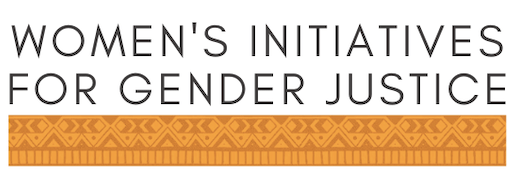Training and Capacity-Building
Training, capacity-building and creating spaces for mutual exchanges with and between partners located in post-conflict or armed conflict situations are important cross-cutting strategies we have applied since 2004, when the Women’s Initiatives for Gender Justice began its work in countries affected by armed conflict.
It is our experience that domestic progress on gender justice within countries affected by armed conflict can only be achieved by partnering with grassroots organisations and women most affected by conflicts and by engaging local decision-makers as critical allies. The efficacy of this methodology has been proven by the progress and successes we have witnessed over many years in multiple conflict-affected situations. It is also one of the guiding principles which influences our partnerships and country-based programmes.
In each country, our work is determined by the priorities of local grassroots advocates and organisations as we collaboratively seek opportunities to leverage progress for gender justice and gender equality domestically and internationally.
Within the context of partnering, we have provided capacity-building, skills development and gender justice strategy workshops for women’s rights and peace advocates from Uganda, the Central Africa Republic, Kenya, Sudan, Libya, the Democratic Republic of the Congo and Kyrgyzstan.
We provide support for the ongoing technical development of our partners and where possible we also provide support for organisational infrastructure of their grassroots groups, whose institutional viability is essential to progressing our shared gender justice goals. Listening and reciprocal knowledge sharing are key components of our approach as we recognise a mutuality of expertise possessed by our partners and the Women’s Initiatives for Gender Justice.
Training provided to local partners: documentation of sexual and gender-based violence in the context of armed conflict for the purpose of supporting domestic and international prosecutions, data analysis, advocacy, report-writing, monitoring and evaluation, developing a theory of change, proposal writing, use of videos and social media as advocacy tools, international gender justice standards including CEDAW and the Rome Statute, engaging the media as strategic partners, and developing a women’s rights agenda and related strategy for peace talks.
Training conducted by local partners
Partners in three provinces in eastern DRC – North Kivu, South Kivu and Province Orientale – undertake gender justice training and capacity-building workshops for local civil society organisations, provincial policy-makers, those within the justice sector and traditional and religious leaders.
These workshops grew out of the advocacy work with decision-makers and the recognition that to motivate these leaders to take action in support of gender justice outcomes, greater awareness, knowledge and capacity on these issues were needed. The workshops target decision-makers, religious leaders and civil society including the youth sector and focus on women’s human rights standards, documenting sexual and gender-based crimes and other human rights violations, United Nations resolutions including Resolutions 1325 and 1820, and the Framework Agreement of Addis Ababa.
The capacity-building strategy is to support the meaningful engagement of decision-makers who wish to act or could be encouraged to act in support of gender justice issues but may feel unsure of what to do or how to go about it.
Between 2013 and 2016, 18 gender justice workshops were held in eastern DRC for civil society, political and community leaders in three provinces involving almost 600 participants.
In Uganda, the engagement of and capacity support for traditional, cultural and local leaders has been an integral component of our gender justice programmes in the past and continues to be utilised in our Reintegration Programme through the hosting of dialogues with cultural leaders from conflict-affected sub-regions in the greater north of Uganda.
Between 2012 and 2015, numerous strategic screenings of our gender justice documentary – No Longer Silent – were held in conflict-affected regions across northern Uganda involving local decision-makers, district council leaders and traditional elders. No Longer Silent includes interviews with several women abducted by the Lord’s Resistance Army (LRA), who describe their experiences in the bush and the challenges they have faced upon their return to their families and communities. The documentary calls for the greater inclusion of female victims of the LRA-related conflict in the Government’s Peace, Recovery and Development Plan for northern Uganda and the need for more inclusion of women as stakeholders and beneficiaries in the reconstruction process.
Watch our gender justice documentary No Longer Silent.
Training with the ICC
Gender in Practice Training Handbook – developed for training workshops we conducted with the ICC in 2005-2006.
Past Training with the ICC
